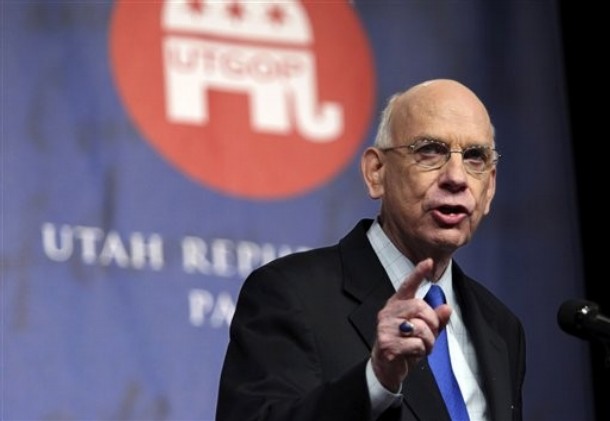Bad Year For Powerful Congressmen?
 Has clout become the kiss of death? Politico‘s Jonathan Allen and Manu Raju think so.
Has clout become the kiss of death? Politico‘s Jonathan Allen and Manu Raju think so.
The back-to-back primary defeats of two powerful appropriators have sent an unmistakable message to lawmakers: The trappings of power can be a trap.
On Wednesday night, West Virginia Democrats eighty-sixed Rep. Alan Mollohan, making him the first House appropriator to lose in a primary since 1980. Over the past weekend, Utah Republicans denied three-term Sen. Bob Bennett a spot in the party’s primary, making him the first Senate appropriator ousted in a nomination contest since Clifford Case of New Jersey in 1978.
Put the losses together with some squeaker wins by veteran members and the sorry poll numbers facing Senate Majority Leader Harry Reid (D-Nev.), and it’s clear that the biggest guns in the incumbent’s arsenal — clout and pork — are misfiring this year.
“People are so upset with the excessive spending — they’re just rising up, with great justification as far as I’m concerned. I’m upset too,” says Sen. Orrin Hatch (R-Utah), who’s already in the sights of some of the conservatives who knocked off Bennett. “And they’re blaming anybody who is an appropriator … because there are too many earmarks with things that aren’t quite right.”
We have enough data to draw conclusions that would be meaningful to a political scientist. It’s a bad year for incumbents, period, and it stands to reason that some powerful incumbents would lose in such a year. It’s always thus, actually. Ask Tom Foley, Dan Rostenkowski, Tom Daschle, and others who lost in wave elections.
Beyond that, even inside a larger trend, individual races are idiosyncratic and frequently turn on local happenings. Mollohan and Bennett didn’t lose because they were powerful appropriators in a year when people are fed up with financial decisionmakers — and they definitely are – but because they had stopped satisfying local needs.
- Mollahan is a traditional Democrat in a West Virginia district that has turned more conservative. The combination of anti-incumbent fervor, Mollahan’s unpopular votes on climate change and health care, and a public perception the Mollahan was corrupt did him in.
- Bennett lost in a bizarre convention-style nominating fight dominated by the most hardline Republicans in a hardline Republican state. His votes on TARP and his unwillingness to appease the Tea Party types didn’t play well in that scenario.
- Reid, as I’ve argued many times, went from a very likable mainstream Democrat in a Republican-leaning state to a very polarizing ideologue as the leader of the Senate Democrats. That’s the nature of the job. But there’s a reason party leaders tend to come from safe states and districts. There’s a pretty good chance Reid will suffer the fate of Foley and Daschle, for similar reasons.
- Orrin Hatch’s poll numbers are down but, goodness, he doesn’t face a vote for two years. But he faces the same obstacles Bennett did. He has to hope that the Tea Party fervor dies down by 2012.
My strong guess is that almost every committee chairman and member of the appropriations committees in both Houses that are running for re-election will in fact be re-elected. Indeed, they’ll likely be re-elected at a higher rate than incumbents not in those categories, since their position means they have longevity and are good at working the system.
Photo credit: AP
There are reasons they are chairman. Also people usually like their representative in position and power and don’t want to lose that. However I see a much higher percentage of them loosing this year. I see many of the political assumptions and tendencies falling to the wayside in this election cycle. Business as usual is not going to cut it. Politicians who don’t realize this will likely pay the price.
Not only that but most incumbents will be re-elected.
Let’s not over-estimate anti-incumbent sentiment. In a regular cycle 90%+ of incumbents are returned to office. In an anti-incumbent year 80%+ of incumbents are.